Cantore Arithmetic is able to state racism can be known before the person is present: The Paint Store! Any Hardware Store is able to show the different colors and also able to bring to task the variable origins of paint to color of mixed. This is not scratch and sniff as that is stifle: Horse equated bride!!
The contents of level now has a grade: In the beginning! As such the comma to in is in division and the Inn is a provender; in the inn equated in the end!!
Proverbs 23:18
“For surely there is an end; and thine expectation shall not be cut off.”
King James Version (KJV)
You searched for
"PROVENDER" in the KJV Bible
7 Instances - Page 1 of 1 - Sort by Book Order - Feedback
- Genesis 24:25chapter context similar meaning copy save
- She said moreover unto him, We have both straw and provender enough, and room to lodge in.
- Judges 19:21chapter context similar meaning copy save
- So he brought him into his house, and gave provender unto the asses: and they washed their feet, and did eat and drink.
- Genesis 42:27chapter context similar meaning copy save
- And as one of them opened his sack to give his ass provender in the inn, he espied his money; for, behold, it was in his sack's mouth.
- Isaiah 30:24chapter context similar meaning copy save
- The oxen likewise and the young asses that ear the ground shall eat clean provender, which hath been winnowed with the shovel and with the fan.
- Genesis 43:24chapter context similar meaning copy save
- And the man brought the men into Joseph's house, and gave them water, and they washed their feet; and he gave their asses provender.
- Judges 19:19chapter context similar meaning copy save
- Yet there is both straw and provender for our asses; and there is bread and wine also for me, and for thy handmaid, and for the young man which is with thy servants: there is no want of any thing.
- Genesis 24:32chapter context similar meaning copy save
- And the man came into the house: and he ungirded his camels, and gave straw and provender for the camels, and water to wash his feet, and the men's feet that were with him.
You searched for
"DIVISION" in the KJV Bible
6 Instances - Page 1 of 1 - Sort by Book Order - Feedback
- John 7:43chapter context similar meaning copy save
- So there was a division among the people because of him.
- John 10:19chapter context similar meaning copy save
- There was a division therefore again among the Jews for these sayings.
- Luke 12:51chapter context similar meaning copy save
- Suppose ye that I am come to give peace on earth? I tell you, Nay; but rather division:
- Exodus 8:23chapter context similar meaning copy save
- And I will put a division between my people and thy people: to morrow shall this sign be.
- John 9:16chapter context similar meaning copy save
- Therefore said some of the Pharisees, This man is not of God, because he keepeth not the sabbath day. Others said, How can a man that is a sinner do such miracles? And there was a division among them.
- 2 Chronicles 35:5chapter context similar meaning copy save
- And stand in the holy place according to the divisions of the families of the fathers of your brethren the people, and after the division of the families of the Levites.
Inn
This article needs additional citations for verification. (October 2013) |

Inns are generally establishments or buildings where travelers can seek lodging, and usually, food and drink. Inns are typically located in the country or along a highway. Before the advent of motorized transportation, they also provided accommodation for horses.
An innkeeper is the name of a person who runs an inn.
History[edit]

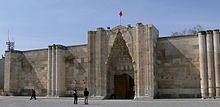

Inns in Europe were possibly first established when the Romans built their system of Roman roadstwo millennia ago. Many inns in Europe are several centuries old. In addition to providing for the needs of travelers, inns traditionally acted as community gathering places.
Historically, inns provided not only food and lodging, but stabling and fodder for the travelers' horses, as well. Famous London examples of inns include The George and The Tabard. However, there is no longer a formal distinction between an inn and several other kinds of establishments: many pubs use the name "inn", either because they are long established and may have been formerly coaching inns, or to summon up a particular kind of image.
Inns were like bed and breakfasts, with a community dining room which was also used for town meetings or rented for wedding parties. The front, facing the road, was ornamental and welcoming for travelers. The back also usually had at least one livery barn for travelers to keep their horses. There were no lobbies as in modern inns; rather, the innkeeper would answer the door for each visitor and judge the people whom he decided to accommodate, it was up to the visitors to convince the innkeeper for accommodation. In some English towns, bye-laws would require innkeepers to offer all visitors a bed.[1] Many inns were simply large houses that had extra rooms for renting.
In 14th century England, the courtyards of the inns were often not paved or cobbled but rather flattened earth or mud. These inns would be made of two-storey timber framed buildings with steep shingle roofs. Stableboys were in charge of stabling horses at the rear yard of the inn where they are watered and fed. Usual foods served included pottage, bread and cheese with ale for drinking. In some towns, innkeepers are only allowed to offer food and drinks to guests. The better managed inns would place fresh rushes on the floor, mixed with rose petals, lavender and herbs. Lighting would be dim, as candles were made of tallow. For toilet facilities, inns would simply provide a seat and a barrel which were emptied every morning. Beds would accommodate more than one man, sometimes even a dozen.[1]
During the 19th century, the inn played a major role in the growing transportation system of England. Industry was on the rise, and people were traveling more in order to keep and maintain business. The English inn was considered an important part of English infrastructure, as it helped maintain a smooth flow of travel throughout the country.[2]
As modes of transport have evolved, tourist lodging has adapted to serve each generation of traveller. A stagecoach made frequent stops at roadside coaching inns for water, food, and horses. A passenger train stopped only at designated stations in the city centre, around which were built grand railway hotels. Motorcar traffic on old-style two-lane highways might have paused at any camp, cabin court, or motel along the way, while freeway traffic was restricted to access from designated off-ramps to side roads which quickly become crowded with hotel chain operators.
The original functions of an inn are now usually split among separate establishments. For example, hotels, lodges and motels might provide the traditional functions of an inn but focus more on lodging customers than on other services; public houses (pubs) are primarily alcohol-serving establishments; and restaurants and tavernsserve food and drink. (Hotels often contain restaurants serving full breakfasts and meals, thus providing all of the functions of traditional inns. Economy, limited service properties, however, lack a kitchen and bar, and therefore claim at most an included continental breakfast.)
The lodging aspect of the word inn lives on in some hotel brand names, like Holiday Inn, and the Inns of Court in London were once accommodations for members of the legal profession. Some laws refer to lodging operators as innkeepers.
Forms[edit]
Other forms of inns exist throughout the world. Among them are the honjin and ryokan of Japan, caravanserai of Central Asia and the Middle East, and Jiuguan in ancient China.
In Asia Minor, during the periods of rule by the Seljuq and Ottoman Turks, impressive structures functioning as inns (Turkish: han) were built because inns were considered socially significant. These inns provided accommodations for people and either their vehicles or animals, and served as a resting place to those travelling on foot or by other means.
These inns were built between towns if the distance between municipalities was too far for one day's travel. These structures, called caravansarais, were inns with large courtyards and ample supplies of water for drinking and other uses. They typically contained a café, in addition to supplies of food and fodder. After the caravans traveled a while they would take a break at these caravansarais, and often spend the night to rest the human travellers and their animals.
Usage of the term[edit]
The term "inn" historically characterized a rural hotel which provided lodging, food and refreshments, and accommodations for travelers' horses. To capitalize on this nostalgic image many typically lower end and middling modern motor hotel operators seek to distance themselves from similar motelsby styling themselves "inns", regardless of services and accommodations provided. Examples are Comfort Inn, Days Inn, Holiday Inn, Knights Inn, and Premier Inn.
The term "inn" is also retained in its historic use in many laws governing motels and hotels, often known as "innkeeper's acts",[3] or refer to hôteliers and motel operators as "innkeepers" in the body of the legislation[4][5] These laws typically define the innkeepers' liability for valuables entrusted to them by clients and determine whether an innkeeper holds any lien against such goods. In some jurisdictions, an offence named as "defrauding an innkeeper" prohibits fraudulently obtaining "food, lodging, or other accommodation at any hotel, inn, boarding house, or eating house";[6] in this context, the term is often an anachronism as the majority of modern restaurants are free-standing and not attached to coaching inns or tourist lodging.
Gallery[edit]
See also[edit]
- Bed and breakfast
- Caravanserai, the Middle Eastern equivalent
- Hostler, a groom who takes care of a traveler's horse
- Youth hostel
References[edit]
- ^ a b Mortimer, Ian (2009). The Time Traveller's Guide to Medieval England: A Handbook for Visitors to the Fourteenth Century. London: Vintage. pp. 143–146. ISBN 9781845950996.
- ^ Chartres, John (2002). The Eighteenth-Century English Inn: A Transient "Golden Age"?. Ashgate. p. 211. ISBN 0-7546-0341-5.
- ^ Innkeepers Act, RSA 2000, c I-2, Consolidated Statutes of Alberta; Innkeepers Act, RSNL 1990, c I-7, Consolidated Statutes of Newfoundland and Labrador; Innkeepers Act, RSO 1990, c I.7 Consolidated Statutes of Ontario
- ^ Hotel Keepers Act, RSBC 1996, c 206, Consolidated Statutes of British Columbia
- ^ Civil Code of Québec, LRQ, c C-1991, Division III: Deposit with an Innkeeper
- ^ "§ 43-21-13 - Defrauding innkeeper :: 2010 Georgia Code :: US Codes and Statutes :: US Law :: Justia". Law.justia.com. Retrieved 2014-07-13.
Further reading[edit]
- Burke, Thomas (1927) The Book of the Inn: being two hundred pictures of the English inn from the earliest times to the coming of the railway hotel; selected and edited by Thomas Burke. London: Constable
- Burke, Thomas (1930) The English Inn. (English Heritage.) London: Herbert Jenkins
- (1947) Revised. (The Country Books.) London: Herbert Jenkins
- Everitt, Alan (1985) "The English Urban Inn", in his: Landscape and Community in England. London: Hambledon Press ISBN 0907628427 (The Oxford Companion to Local and Family History (ed. David Hey), 1996, describes this as "the starting point for modern studies [of inns]"; Everitt described most of the previous literature on the topic as "a wretched farrago of romantic legends, facetious humour and irritating errors")
- Douch, H. L. (1966) Old Cornish Inns and their place in the social history of the County. Truro: D. Bradford Barton
- Monson-Fitzjohn, G. J. (1926) Quaint Signs of Olde Inns. London: Herbert Jenkins (reissued by Senate, London, 1994 ISBN 1-85958-028-9)
- Richardson, A. E. (1934) The Old Inns of England. London: B. T. Batsford
- Sherry, John (1972) The Laws of Innkeepers; for hotels, motels, restaurants and clubs. Ithaca, NY: Cornell University Press ISBN 0801407028
External links[edit]
- Congleton's ancient Inn Signs
- The Lost Pubs Project: Lost and closed pubs of the UK.









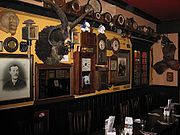


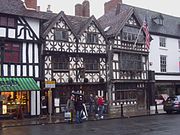
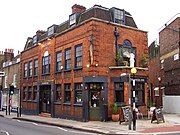



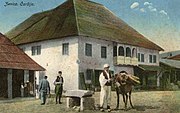
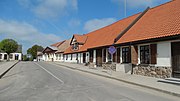
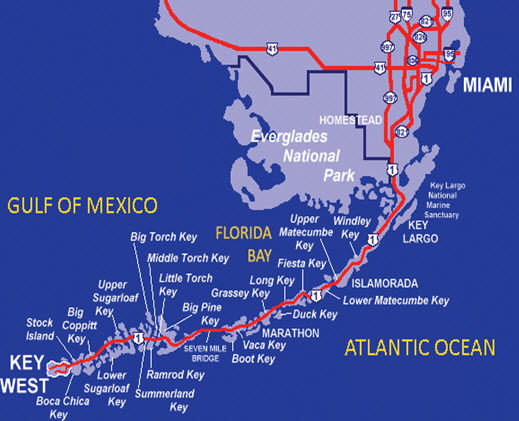








No comments:
Post a Comment